


If you are experiencing symptoms such as shortness of breath, chronic fatigue, palpitations, or cyanosis, it’s important to pay attention. These signs may indicate a hole in the heart, specifically atrial septal defects (ASDs), which can be serious. Early detection and intervention are vital for managing these symptoms effectively. Ignoring them can lead to significant cardiovascular complications, which is something we want to avoid.
Understanding your health is crucial, and we are here to support you. It’s natural to feel anxious about these symptoms, but remember, seeking help is a positive step towards better health. By addressing these concerns early, you can take control of your well-being and reduce the risk of complications.
We encourage you to reach out to a healthcare professional if you notice any of these symptoms. You deserve the best care and support, and we are here to guide you through this journey. Remember, you are not alone, and there are solutions available to help you feel better.
Recognizing the symptoms of a hole in the heart is crucial for adults, as these signs can often be subtle yet significant indicators of underlying cardiovascular issues. Atrial septal defects (ASDs), a common congenital condition, can lead to serious health complications if not diagnosed and treated promptly.
With studies showing that ASDs account for a substantial percentage of congenital heart disease cases in adults, the urgency for awareness and early intervention becomes clear.
What are the key symptoms that individuals should be vigilant about?
How can timely recognition make a difference in health outcomes?
It's important to understand that being aware of these signs can lead to improved health and peace of mind.
At Amavita Heart and Vascular Health, we understand that navigating health concerns can be daunting, especially when it comes to conditions like atrial septal defects (ASDs). These common congenital issues can lead to serious complications if not addressed promptly. Recent studies reveal that ASDs account for 25% to 30% of congenital heart disease diagnoses in adults, highlighting the importance of vigilant screening and early intervention.
Our dedicated team, led by a skilled geriatric cardiologist, employs advanced diagnostic tools with a compassionate approach. We strive to identify symptoms early, which significantly improves outcomes for our patients. Recognizing that the symptoms of hole in heart in adults can present differently is crucial for effective management. Timely closure of these defects can markedly reduce the risk of long-term cardiovascular issues.
We emphasize that early detection is vital, as it allows for personalized treatment strategies that enhance survival rates and improve quality of life. At Amavita, we are committed to ensuring that every patient receives the utmost standard of care in their journey toward better cardiovascular health. You are not alone in this; we are here to support you every step of the way.
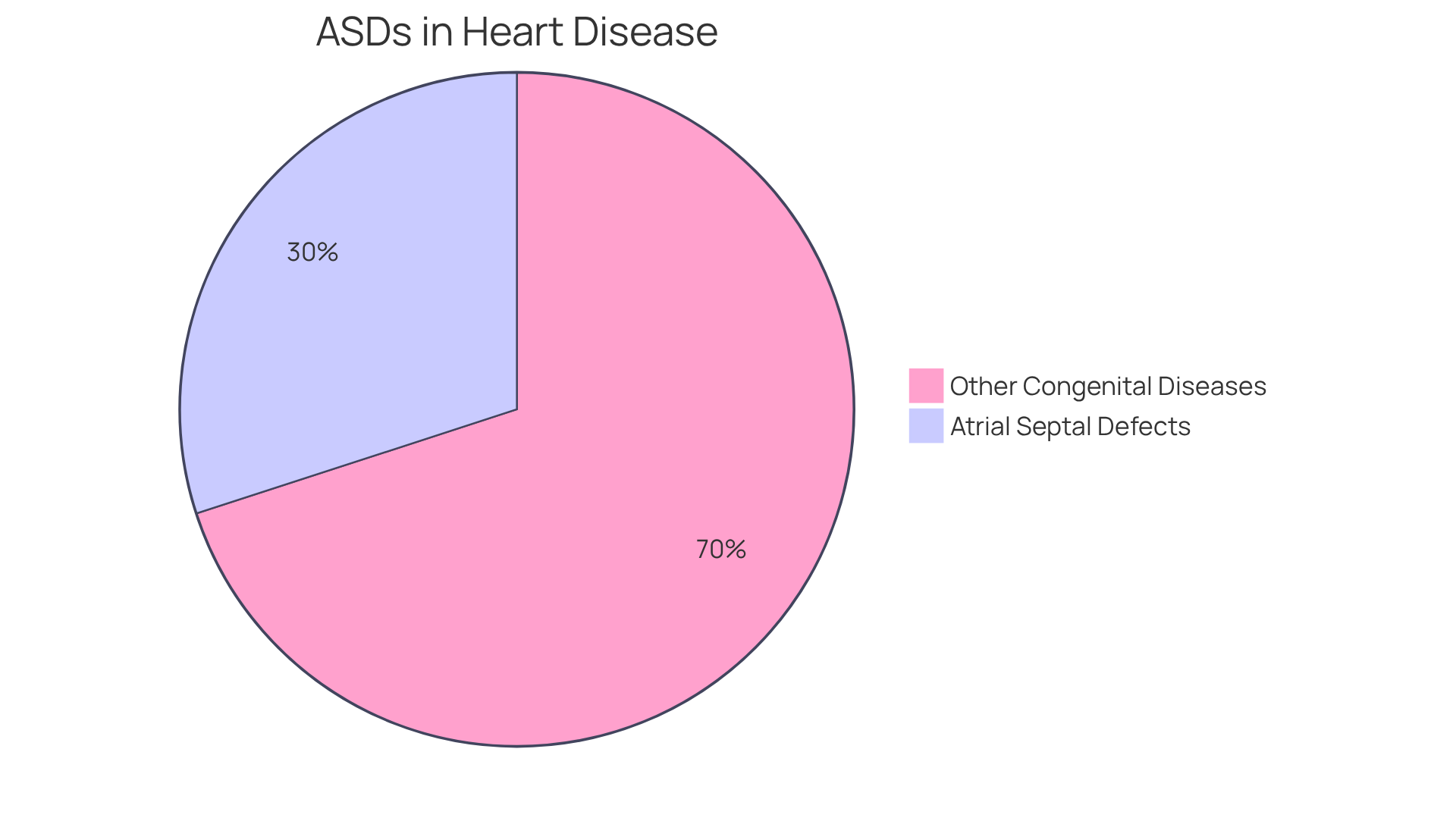
Shortness of breath, or dyspnea, can often be one of the earliest symptoms of hole in heart in adults, particularly concerning cardiac issues. This symptom may arise during physical activity or even while at rest, indicating that the heart might be struggling to pump blood effectively. It's important to note that research shows approximately 20% of adults experience shortness of breath, which can be one of the symptoms of hole in heart in adults, related to cardiovascular concerns, underscoring its prevalence as a warning sign.
In addition to this, ongoing research is exploring the connection between dyspnea and cardiac abnormalities. Many individuals report experiencing symptoms of hole in heart in adults before receiving a diagnosis. For instance, a case study involving a 57-year-old male patient with a history of coronary artery disease revealed that his shortness of breath was linked to significant coronary stenoses. Furthermore, shortness of breath can also signal valve disease, where improper valve function forces the heart to work harder, leading to symptoms like breathlessness and fatigue.
At Amavita Heart and Vascular Health, Dr. Martinez-Clark specializes in minimally invasive valve treatments that can repair or replace damaged valves without the need for open-heart surgery. These procedures not only improve breathing and energy levels but often allow for same-day discharge, making recovery easier for patients.
If you're experiencing unexplained shortness of breath, it's crucial to reach out to a healthcare expert for a thorough assessment at Amavita. Early identification can lead to more effective management of potential cardiovascular issues, and we are here to support you every step of the way.
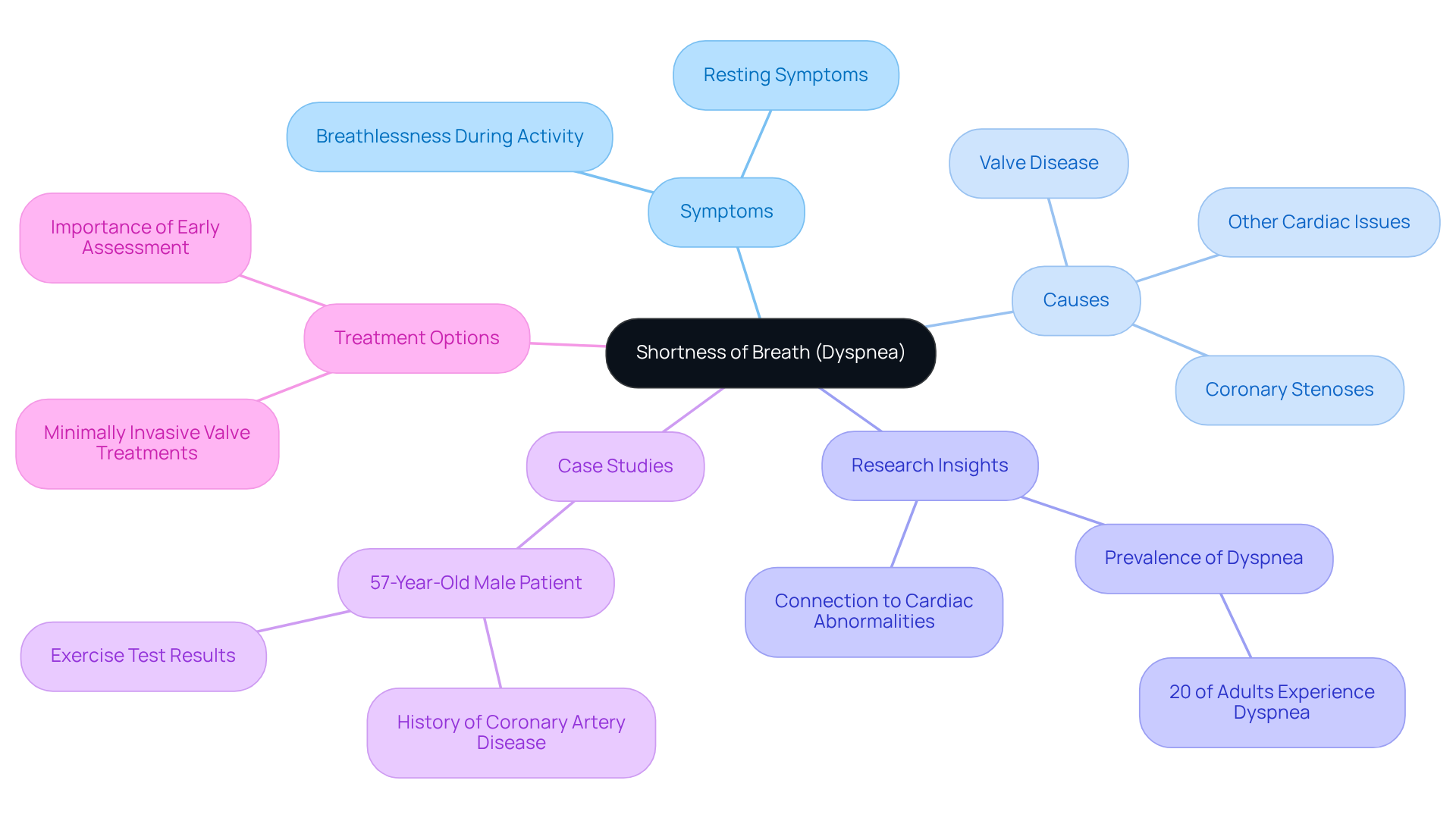
Chronic fatigue can be a subtle yet significant sign of symptoms of a hole in the heart in adults, such as an ASD. When the heart struggles to circulate blood efficiently, it can lead to symptoms of a hole in the heart in adults, as the body may not receive the oxygen it needs, resulting in ongoing fatigue. Have you been feeling unusually tired, especially after minimal exertion? If so, it’s essential to talk to your doctor about the symptoms of a hole in the heart in adults.
At Amavita Heart and Vascular Health®, we understand how concerning these feelings can be. Our innovative, AI-powered diagnostic technology, including a portable, FDA-cleared AI ultrasound, allows for bedside cardiac diagnostics. This technology provides real-time assistance for precise imaging and generates reports on cardiac structure and function within minutes. Such advancements enable early detection of conditions like ASDs, ensuring that you receive timely and informed care.
If you experience chronic fatigue, please know that our AHA-certified framework is designed to provide care adhering to the highest evidence-based standards. We are here to support you in enhancing your overall health outcomes, and we encourage you to reach out for help. Your health and well-being are our top priorities.
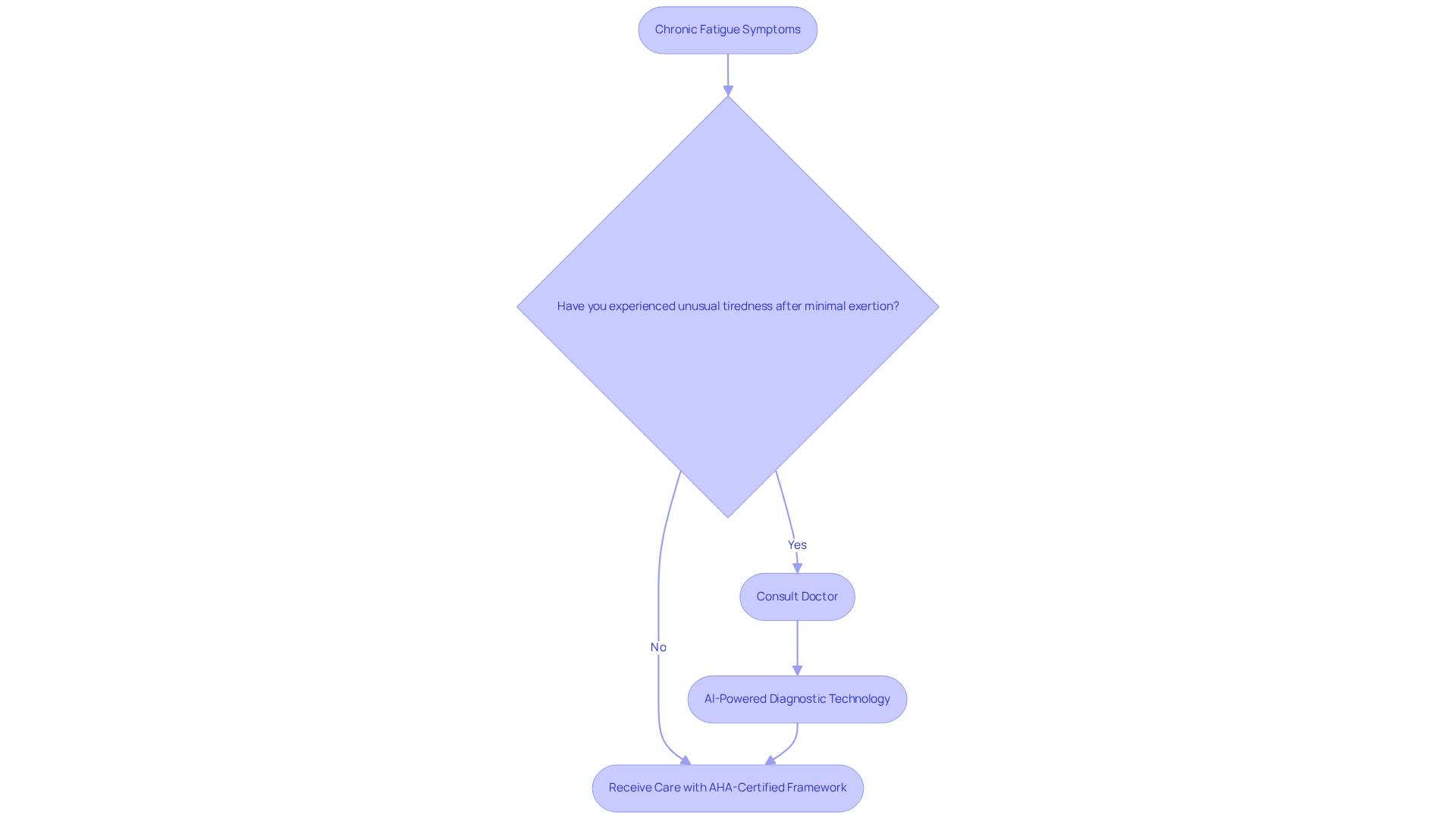
Palpitations, which can feel like a racing or irregular heartbeat, may be a crucial warning sign of underlying heart conditions, such as atrial septal defects (ASDs). These irregularities can occur during physical activity or even at rest, showcasing their unpredictable nature. It's important to note that research shows adults with ASDs face a heightened risk of developing atrial arrhythmias, especially as they get older. The likelihood of experiencing these irregular heartbeats can increase significantly in individuals over 60, making vigilant monitoring and timely intervention essential.
If you find yourself experiencing frequent palpitations, especially if they are accompanied by symptoms of hole in heart in adults such as dizziness, shortness of breath, or fatigue, please seek medical attention promptly. Cardiologists stress that early detection and management of the symptoms of hole in heart in adults can lead to improved outcomes, helping to prevent complications that may arise from untreated ASDs. Amavita's CardioElite™ program represents a compassionate and comprehensive approach to managing such conditions, providing advanced, real-time diagnostic data and 24/7 cardiology consultation. This proactive care model is especially important for older individuals dealing with frequent palpitations.
Real-world case studies illustrate that those who report palpitations often benefit from thorough evaluations, such as echocardiograms and rhythm monitoring, which assess the severity of their condition and guide appropriate treatment strategies. Furthermore, the integration of AI and AHA certification within the CardioElite™ program enhances its effectiveness, ensuring that individuals receive the highest standard of care. It is advisable for individuals aged 60 years or older to undergo routine rhythm monitoring after ASD closure, highlighting the importance of proactive care in this age group.
Studies have indicated a dual-phase increase in atrial arrhythmias following ASD closure, underscoring the need for ongoing follow-up care—an essential element of the CardioElite™ program. Remember, you are not alone in this journey, and support is readily available to help you navigate your health concerns.
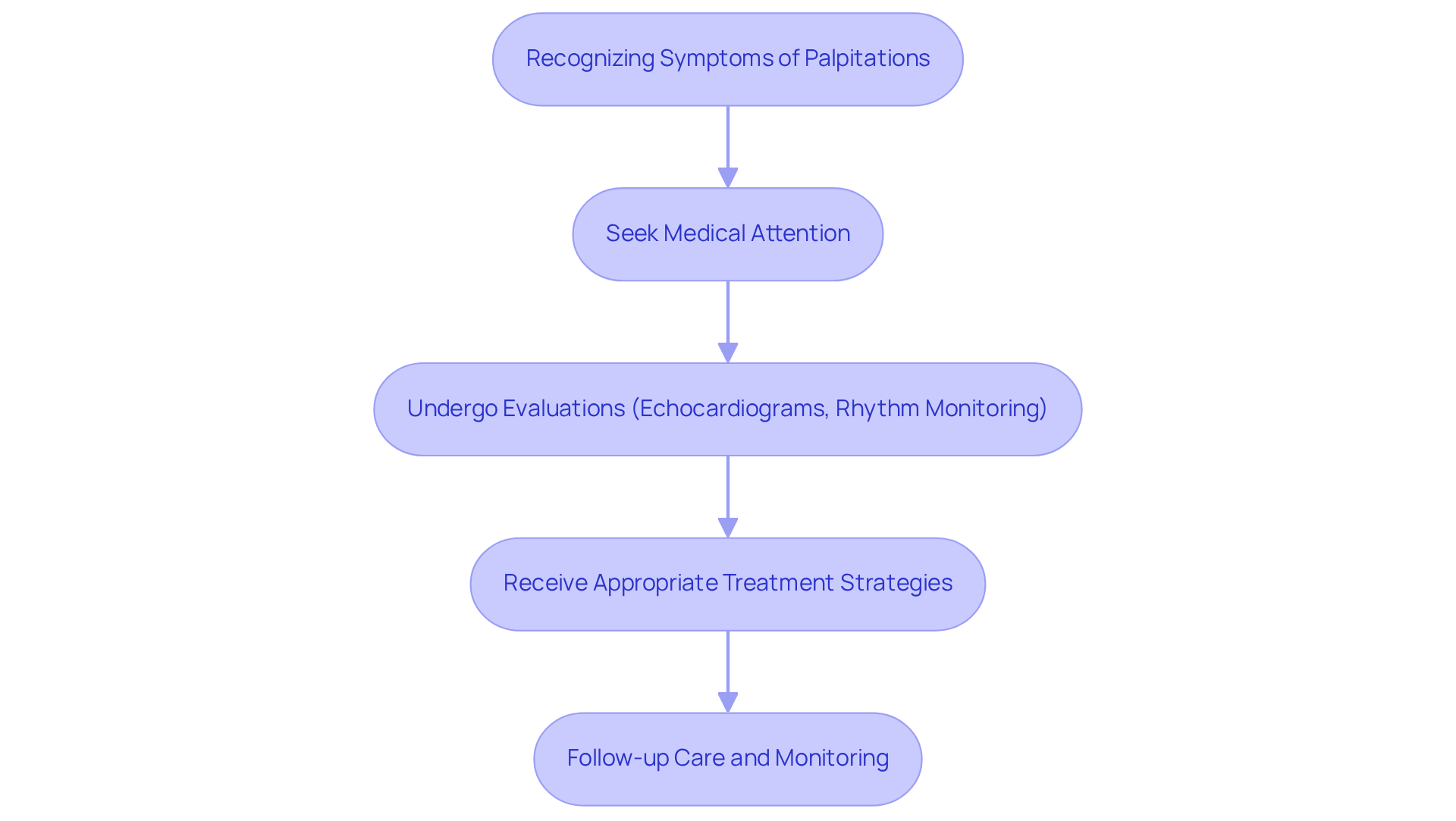
Adults with a defect in the cardiovascular system often find themselves battling frequent respiratory infections. This is primarily due to compromised blood circulation and oxygenation, which can significantly heighten the risk of developing pneumonia or bronchitis. Research indicates that individuals with atrial septal defects (ASDs) experience a notably higher occurrence of pneumonia. This highlights the importance of monitoring respiratory health in these individuals. Cardiologists emphasize that repeated respiratory infections may signal symptoms of hole in heart in adults, urging anyone who notices such patterns to consult their healthcare providers.
At Amavita Cardiovascular and Vascular Health, we are dedicated to providing specialized care for high-risk patients, including those with diabetes, hypertension, or a family history of cardiovascular conditions. Our advanced imaging and comprehensive evaluations are designed to ensure that any underlying issues are promptly addressed. If you are experiencing frequent respiratory infections, we encourage you to reach out to your healthcare provider. Investigating potential links to your cardiovascular well-being can be a crucial step. Addressing these concerns early on can lead to better management of both your cardiovascular and respiratory health, allowing you to feel more secure and supported in your journey.
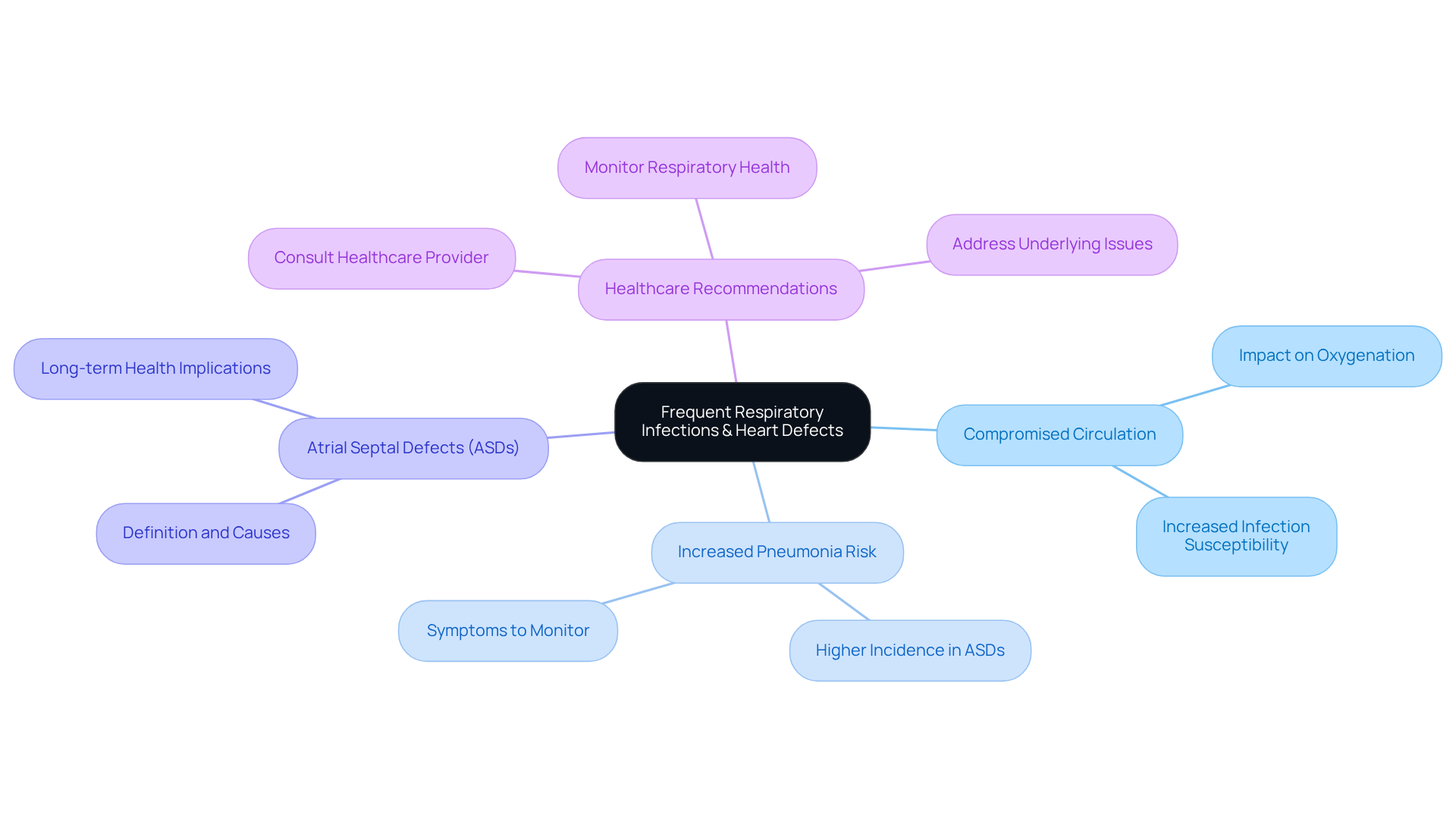
Cyanosis, which presents as a bluish hue to the skin—particularly around the lips and fingertips—can be one of the symptoms of hole in heart in adults that should never be ignored. It indicates that the body may not be receiving enough oxygen, which could be one of the symptoms of hole in heart in adults, potentially due to a cardiac defect like an ASD. Thankfully, with the innovative AI-powered diagnostic technology provided by Amavita CardioElite™, recognizing these symptoms early is more achievable than ever.
This program features a portable, FDA-cleared AI ultrasound designed for bedside cardiac diagnostics, offering real-time guidance to ensure accurate imaging. The AI algorithms generate detailed reports on cardiac structure and function in just minutes, empowering healthcare providers to make informed decisions. In addition to this, the CardioElite™ program includes a guided pathway to AHA certification and comprehensive staff education, ensuring that healthcare professionals are well-prepared to manage these critical conditions.
If you or someone you care about shows signs of cyanosis, it is crucial to seek emergency medical care immediately. Timely intervention can significantly improve outcomes, and we want you to know that help is available. Your health and well-being are our top priorities, and we are here to support you every step of the way.
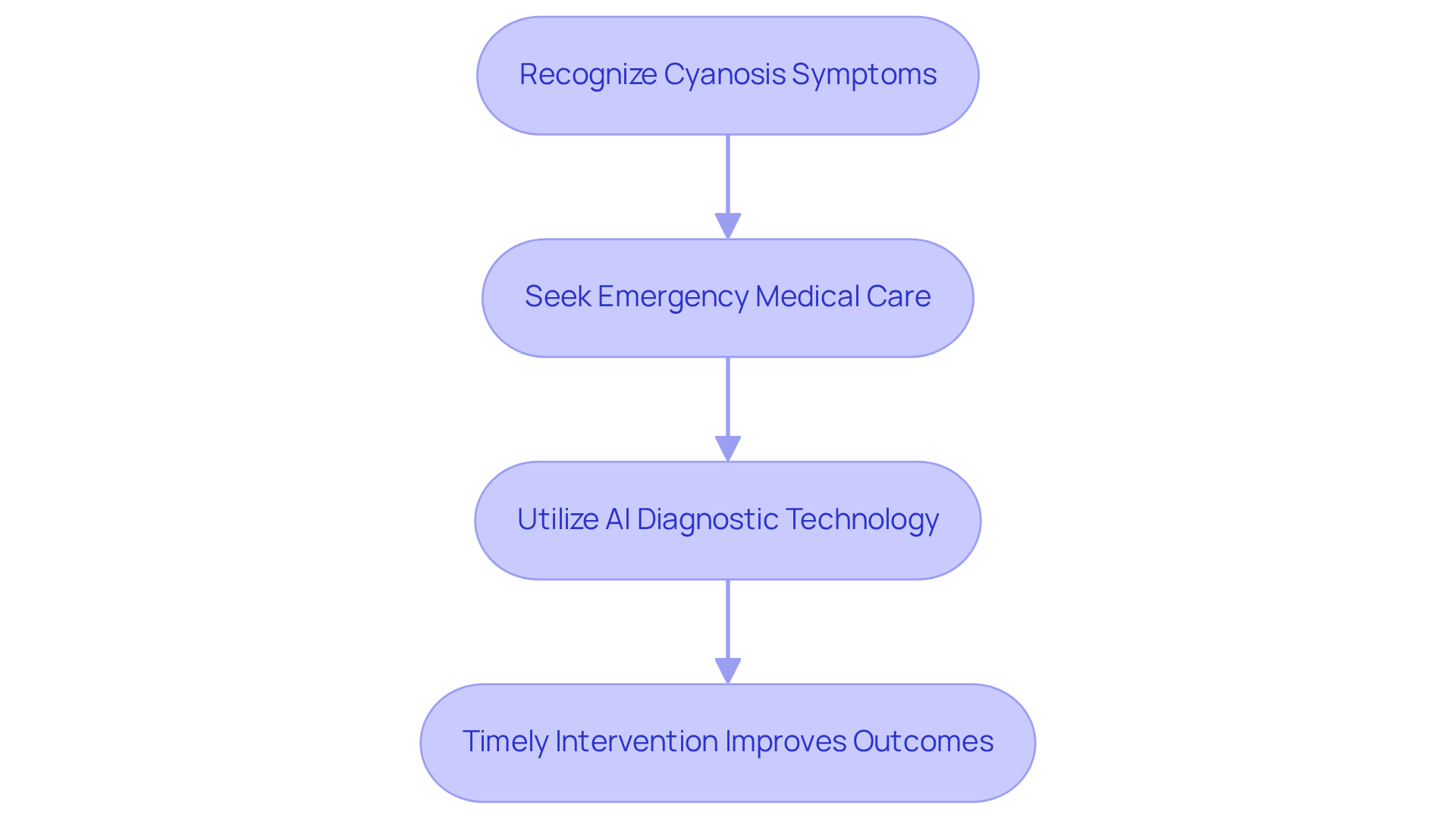
Swelling in the legs, ankles, or abdomen can be a serious sign of fluid retention, particularly for adults with cardiovascular issues like heart dysfunction. This condition arises when the heart struggles to pump blood effectively, leading to fluid accumulation throughout the body. It’s concerning that around 25% of individuals with cardiovascular problems find it challenging to manage follow-up appointments or adhere to their medication schedules, which can exacerbate symptoms such as swelling. Cardiologists emphasize the importance of recognizing unexplained swelling as a potential warning sign of cardiovascular issues.
Dr. Eldrin advises that if you notice a weight gain of more than 2 pounds in a day or 4 pounds in a week, it’s essential to reflect on your recent dietary choices, particularly for sources of excess sodium or fluid. This awareness is crucial, as many individuals may retain 8 to 15 pounds of excess fluid before they notice significant swelling in their legs or abdomen. Real-world experiences show that elderly patients with cardiac conditions often face fluid retention, manifesting as increased swelling and discomfort.
If you observe unexplained swelling, especially when accompanied by symptoms like shortness of breath, it’s vital to seek guidance from a healthcare professional promptly. Addressing any underlying cardiovascular conditions is essential for your well-being. Remember, you are not alone in this journey, and support is available to help you through these challenges.
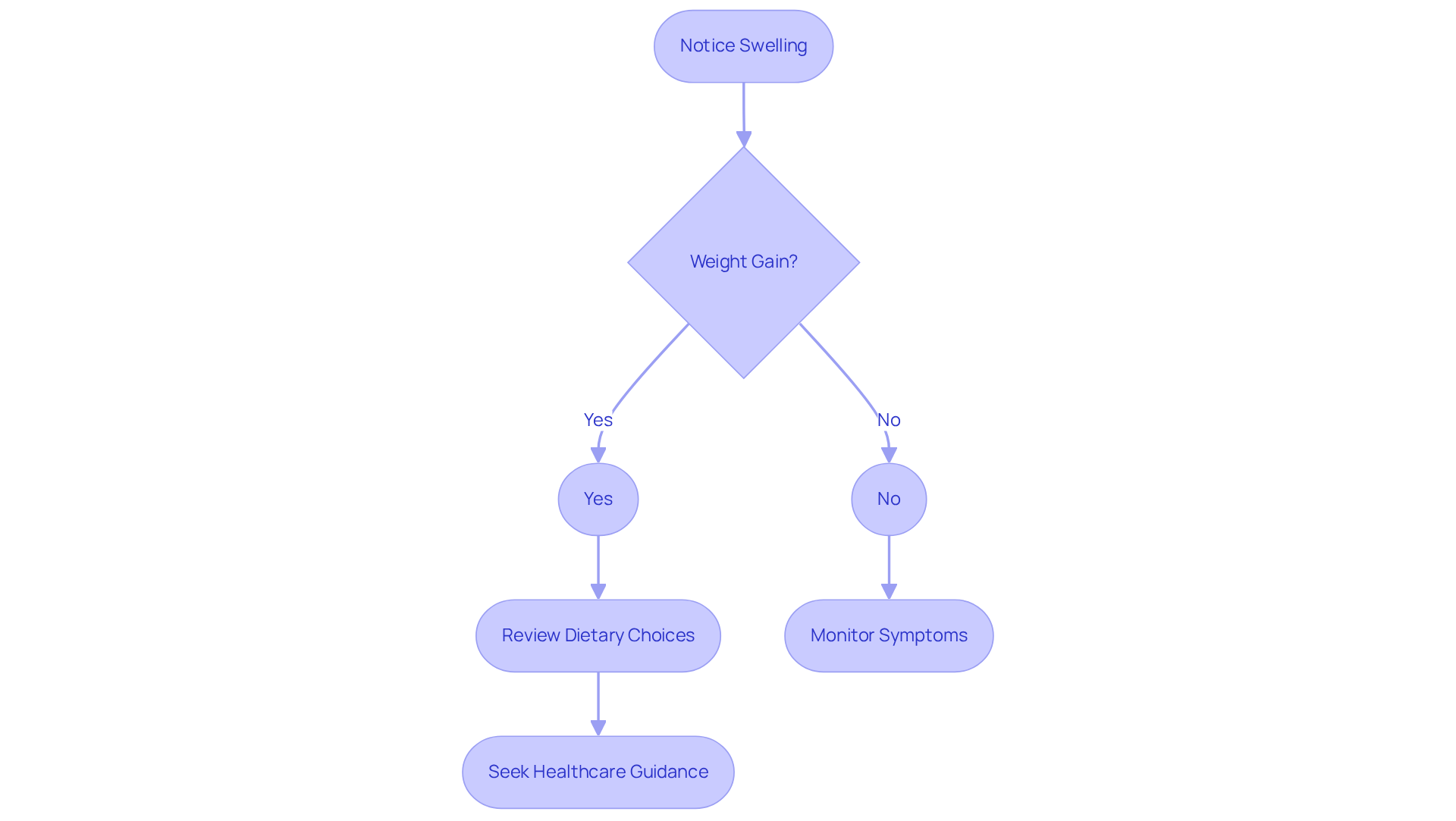
Experiencing dizziness or fainting can be concerning, especially when these episodes occur unexpectedly or frequently. These symptoms may indicate a cardiovascular issue, which can include symptoms of hole in heart in adults, often stemming from insufficient blood flow to the brain due to a heart condition or arrhythmia. If you find yourself facing recurrent dizziness or fainting, it’s crucial to seek medical evaluation to uncover the underlying cause.
At Amavita Heart and Vascular Health, our compassionate specialists are dedicated to your well-being. We employ advanced diagnostic imaging to identify potential cardiac issues, including arrhythmias that may contribute to these symptoms. In addition to dizziness, the symptoms of hole in heart in adults may also include chest pain or discomfort, which further underscores the importance of a thorough assessment.
We understand that seeking help can be daunting, but rest assured, we provide extensive management and minimally invasive therapies to help restore your body's natural rhythm. Our goal is to ensure you receive the care you need with minimal disruption to your life. Remember, you are not alone on this journey; we are here to support you every step of the way.
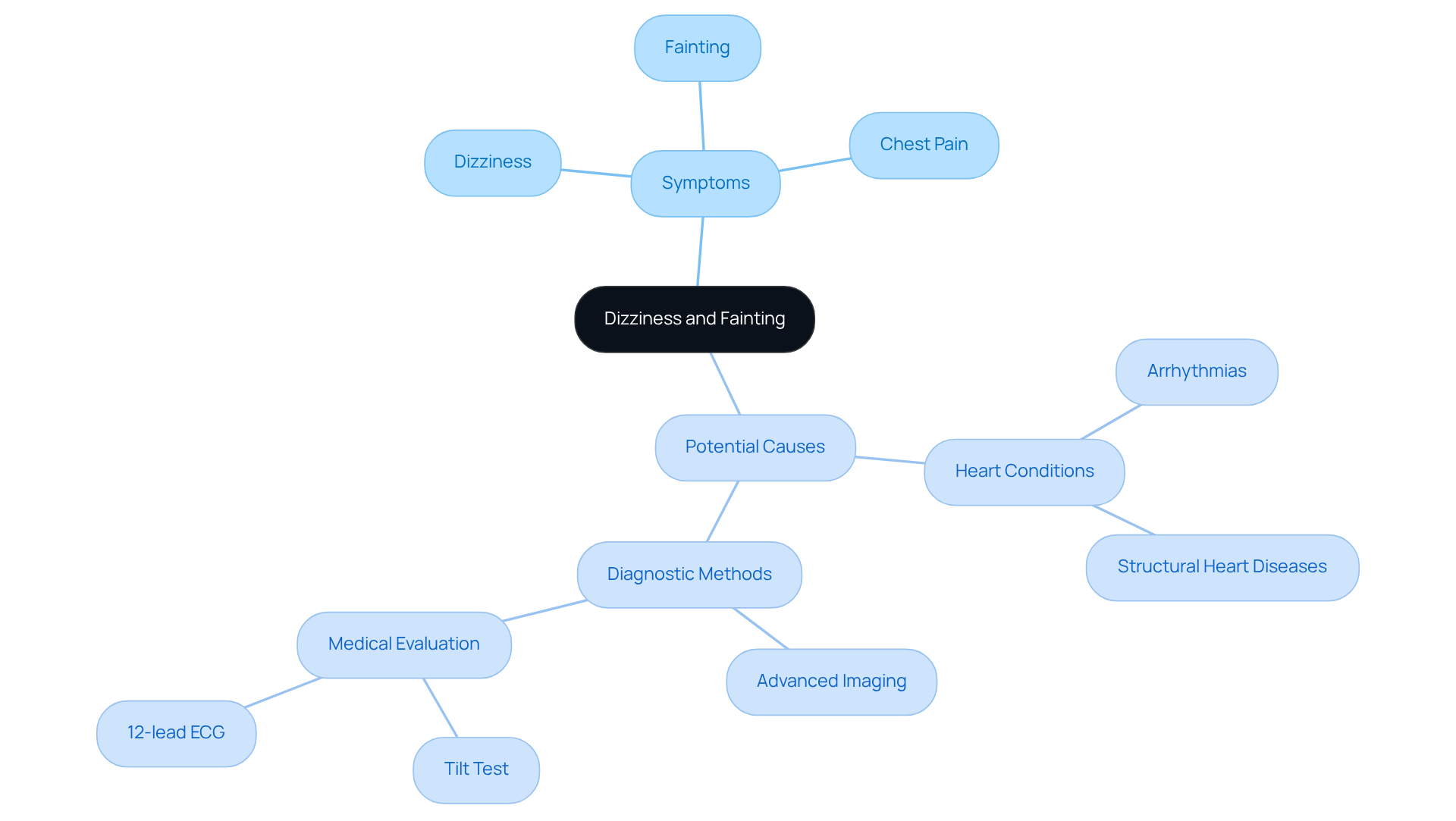
A cardiac murmur is an unusual sound during the heartbeat cycle, often discovered during routine check-ups. While some murmurs are harmless, others can indicate underlying cardiac conditions, such as atrial septal defects (ASDs). It's important to note that research suggests around 23% of adults may show murmurs, which can have varying implications for cardiovascular health. For instance, a study involving over 2,000 participants revealed that systolic murmurs had a 100% sensitivity for detecting aortic stenosis, highlighting their significant diagnostic value.
In adults, the presence of a cardiac murmur can signal the need for further assessment, especially if it is associated with symptoms like shortness of breath or fatigue. Cardiologists emphasize the importance of auscultation as an initial screening method, particularly for recognizing valvular cardiovascular disease (VHD). For example, men with low-grade systolic murmurs, while not at increased risk for cardiovascular disease mortality, face a five-fold higher likelihood of requiring aortic valve replacement. This information can be concerning, but it is crucial to understand that early detection can lead to better outcomes.
Real-world examples illustrate the significance of identifying murmurs in the cardiovascular system. In one case, a middle-aged man with a previously undiagnosed ASD was found to have a significant murmur during a routine check-up. This discovery led to timely intervention and improved health outcomes, showcasing the essential role of early detection in managing cardiovascular defects. Such stories remind us of the importance of regular check-ups and being attentive to our bodies.
Overall, understanding the implications of cardiac murmurs is vital for effective cardiovascular care. Routine examinations and awareness of unusual cardiac sounds can result in early identification and care, ultimately enhancing patient quality of life. Remember, if you have concerns about your heart health, don’t hesitate to reach out for support. Your well-being is important, and there are professionals ready to help you navigate your health journey.
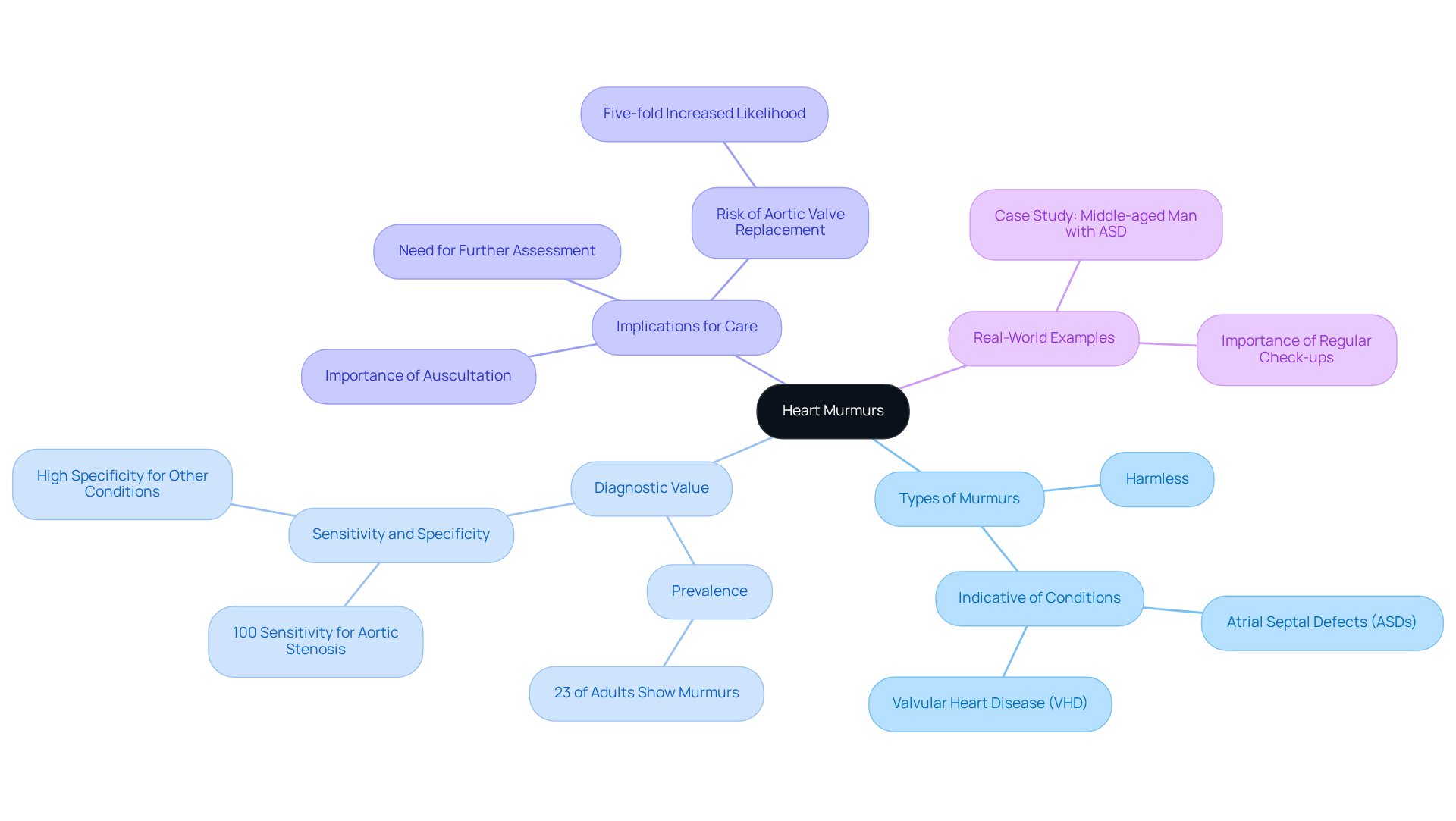
If you notice any signs of cardiac abnormalities, it’s crucial to seek medical care without delay. Early diagnosis and intervention can significantly improve outcomes for those facing these challenges. Recent guidelines highlight the need to address cardiovascular symptoms promptly, particularly for conditions like valvular disease, which tends to affect the elderly more. Research indicates that timely care can lead to meaningful improvements in health and longevity.
Cardiologists emphasize that early identification is key; as one specialist noted, 'The sooner we recognize and address cardiac defects, the better the outcome for our patients.'
At Amavita Heart and Vascular Health, our compassionate team is dedicated to providing comprehensive care and support, ensuring you receive the attention and treatment you need to navigate your heart health journey with confidence.
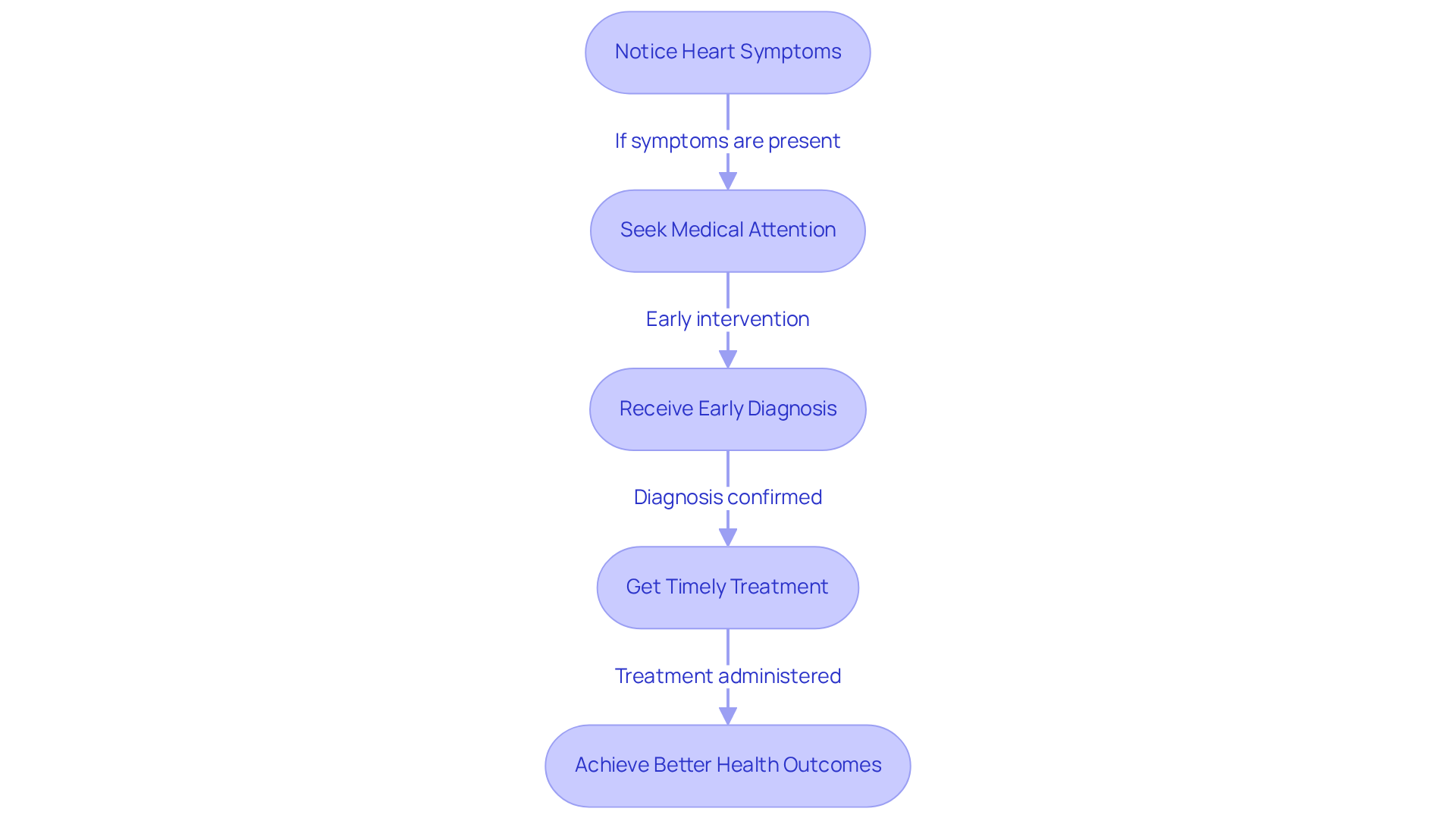
Recognizing the symptoms of a hole in the heart is crucial for adults, as timely intervention can significantly enhance health outcomes. Atrial septal defects (ASDs) and other congenital heart issues often manifest with a variety of symptoms that may be easily overlooked. By understanding these signs—such as shortness of breath, chronic fatigue, palpitations, and even cyanosis—individuals can take proactive steps toward seeking medical evaluation and care.
Throughout this article, we have discussed key symptoms, highlighting their significance in identifying potential heart defects. Shortness of breath and fatigue often indicate the heart's struggle to function effectively, while palpitations and dizziness can signal serious underlying conditions. Furthermore, the connection between frequent respiratory infections and heart defects underscores the intricate relationship between cardiovascular health and overall well-being. Each of these symptoms serves as a vital cue for individuals to consult healthcare professionals, ensuring that any issues are addressed before they escalate.
In conclusion, awareness and early detection of heart symptoms are paramount for maintaining cardiovascular health. If you are experiencing any of the discussed symptoms, please do not hesitate to seek medical attention. Your commitment to understanding and addressing these signs is essential for enhancing your quality of life and preventing further complications. Remember, proactive health management can lead to better outcomes, and support is always available to guide you on your journey toward improved heart health.
What is an atrial septal defect (ASD)?
An atrial septal defect (ASD) is a common congenital heart issue characterized by a hole in the wall (septum) that separates the heart's upper chambers (atria). If not addressed promptly, ASDs can lead to serious complications.
How prevalent are ASDs among congenital heart diseases in adults?
ASDs account for 25% to 30% of congenital heart disease diagnoses in adults, emphasizing the importance of vigilant screening and early intervention.
What are the symptoms of a hole in the heart in adults?
Symptoms of a hole in the heart in adults can vary, but common indicators include shortness of breath, chronic fatigue, and other cardiovascular concerns.
Why is early detection of ASDs important?
Early detection allows for personalized treatment strategies that can enhance survival rates and improve quality of life, significantly reducing the risk of long-term cardiovascular issues.
What role does shortness of breath play in identifying heart issues?
Shortness of breath, or dyspnea, can be one of the earliest symptoms of heart issues, indicating that the heart may be struggling to pump blood effectively. It is a prevalent warning sign of potential cardiovascular concerns.
How does chronic fatigue relate to heart defects?
Chronic fatigue can be a subtle sign of heart defects like ASDs, as the heart's inability to circulate blood efficiently may prevent the body from receiving adequate oxygen, leading to ongoing fatigue.
What advanced diagnostic tools does Amavita Heart and Vascular Health use?
Amavita employs innovative, AI-powered diagnostic technology, including a portable, FDA-cleared AI ultrasound, which provides real-time imaging and reports on cardiac structure and function.
What treatment options are available for valve disease at Amavita?
Dr. Martinez-Clark specializes in minimally invasive valve treatments that can repair or replace damaged valves without open-heart surgery, improving symptoms like breathlessness and fatigue.
What should I do if I experience unexplained shortness of breath or chronic fatigue?
It is crucial to reach out to a healthcare expert for a thorough assessment. Early identification can lead to more effective management of potential cardiovascular issues.